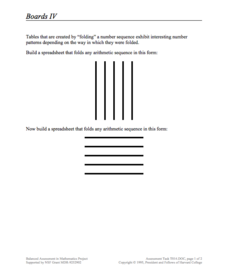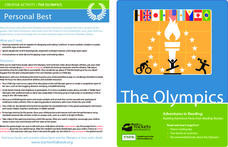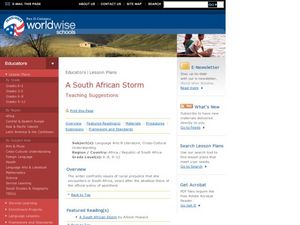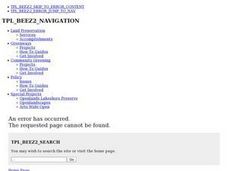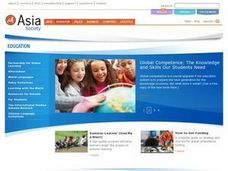Concord Consortium
Boards IV
Build a connection between algebraic sequences and spreadsheets. Learners examine a specific folding pattern and convert the pattern into a spreadsheet. The goal of the spreadsheet is to produce a sequence of a specific pattern modeled...
Judicial Learning Center
Law and the Rule of Law
We hear a lot about the importance of the rule of law, but most people do not really know what those words mean. The lesson is a webpage that defines the rule of law, explains why it is important in a democratic society and provides...
Jamestown-Yorktown Foundation
How Do We Know about Colonial Life?
Young history sleuths examine an inventory of the belongings of a Virginia colonist and use deductive reasoning to determine what the document reveals about colonial life. They then use a Venn diagram to compare the inventory with a...
PBS
“He Named Me Malala”: Understanding Student Activism Through Film
Malala Yousafzai has become the face of social activism. After watching He Named Me Malala and short student-made films about what young people can do to become instruments of change, class members reflect on what it means to be an...
Stanford University
Expansion of the Inca Empire
If you could write your own history textbook, what would you include? Learners play the role of textbook writers by examining evidence of the Inca Empire. With primary sources from Spanish and indigenous perspectives, as well as images,...
Stanford University
Evaluating Historical Sources on Juana Briones
Most have never heard of Juana Briones, the incredible woman who came to own property and divorce her husband in 1850s California. Yet, her relatively unknown life reflects the historical dynamics of the American West, particularly those...
American Museum of Natural History
What is Astronomy?
Go study the universe. Pupils learn seven aspects about astronomy and astronomers. They begin to learn about constellations; distance and motion between objects; gravity; the electromagnetic spectrum; dark matter and energy; and teams of...
American Museum of Natural History
What Do You Know About the Universe?
The universe is full of a mystic matter people cannot see. Pupils respond to 10 questions about the stuff in the universe. Most of the questions involve the big bang theory and dark matter. Learners find out how astronomers have found...
American Museum of Natural History
Make Your Own Astronomy Stationary
Scholars follow five steps to create personalized, astronomy-themed stationary.
American Museum of Natural History
Are YOU Cut Out for Mars?
A brief, 6-question quiz identifies whether or not a scholar is ready for a mission to Mars.
American Museum of Natural History
Beyond Planet Earth
Scholars take a journey through space with 16 eye-catching images. Along the way, learners read captions starting with the moon, then move onto asteroids, Mars, and Jupiter.
EngageNY
Mid-Unit 3 Assessment, Part I: Short Constructed Response and Organizing Notes for a Public Speech
It's time to put pen to paper. Scholars complete the first part of the mid-unit 3 assessment, writing a short constructed response about international aid following a natural disaster. Next, pupils use informational texts and note...
EngageNY
Mid-Unit 3 Assessment, Part II: Organizing Notes for a Public Speech
It's all a matter of opinion! Pupils take Part II of the mid-unit assessment, in which they continue organizing their notes in preparation for writing an opinion speech. Using the resource, they add reasons, evidence, and a concluding...
EngageNY
Final Performance Task: Delivering an Opinion Speech with Multimedia Display
Welcome to the grand finale! Scholars practice reading their speeches to a partner and make last-minute changes based on feedback. Pupils then present their final opinion speeches to their small groups and show off their work in a...
PBS
Reading Adventure Pack: The Olympics
The mini Reading Adventure Pack takes a close look at the Olympics. After reading a fiction and nonfiction story, scholars research facts about the host country or a country of their choice participating in the games. The research...
Curated OER
A South African Storm
Young scholars explore racial prejudice in South Africa through the reading of "A South African Storm" by Allison Howard. In this cultural and geography lesson, students discuss ethnicity and prejudices and cite examples from the letter....
Curated OER
Pronoun Reference - Exercise 5
Young grammarians demonstrate their understanding of pronoun reference. They read a series of sentences and choose the best correction for the underlined words. A link to an interactive version of the exercise is provided.
Curated OER
Dangerous Situations
Learners identify trusted adults and learn how to respond to dangerous situations
Curated OER
What's Safe?
Students identify safe and unsafe activities when home alone and practice decision-making skills.
Curated OER
Perceiving the Prairie
Twelfth graders explore the changing concept of "prairie" through written and artistic works. They write their own poem or essay describing the prairie after discussing how differently people perceive the prairie.
Curated OER
Fire Fighting
Students consider the effects of a wildfire on prairie life. They explore the ways that plants regenerate after a fire and create fictional plants that have adapted specifically to the prairie environment. They share models of their plants.
Curated OER
Loyalists and Loyalism in the American Revolution
Students engage in activities to understand how ideologies were constructed before and during the Revolutionary War. How and why were some "reluctant revolutionaries" turned into whig patriots willing to fight against the British empire,...
Curated OER
Trade in the Indian Ocean: Should China End Zheng He's Treasure Voyages?
Students examine the amount of trade that occurs in the Indian Ocean. Using China as an example, they discuss the reasons why it ended its treasure voyages in the area and predict what would have happened if the voyages continued. They...
Curated OER
Reading Comprehension- Informational Passages "Abraham Lincoln"
Who was Abraham Lincoln? Help your English language learners recognize Lincoln's impact on the United States. After reading a short passage, learners answer five reading comprehension questions and five vocabulary questions.
Other popular searches
- Community and Neighbors
- Communicating With Neighbors
- Good Neighbors
- India and Its Neighbors
- Neighbors English
- Math Strategies Neighbors
- Neighbors for Jesus
- Conversation About Neighbors
- Noisy Neighbors
- India's Neighbors


